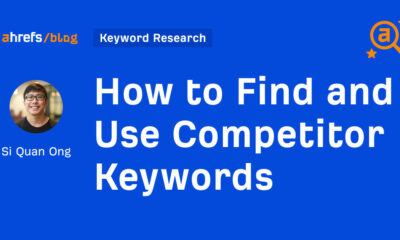SEO
The #1 Factor That Will Help Your Content Rank in Google
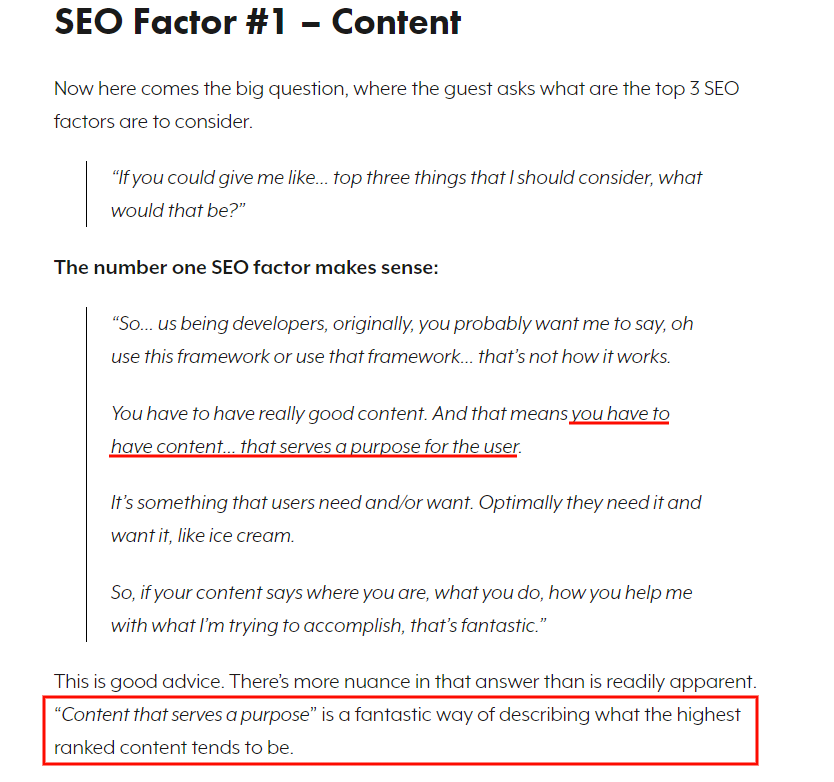
If one thing matters more than anything to Google, it’s your content’s relevance to the reader.
(Is it useful? Does it serve a purpose for them connected to their search intent?)
This fact came into focus once again in the first episode of Google’s YouTube series, SEO Myth Busters.
In particular, a Search Engine Journal post by Roger Montti outlines insights from this episode we can apply right now.
The #1 SEO factor mentioned: user-relevant content that serves a purpose.
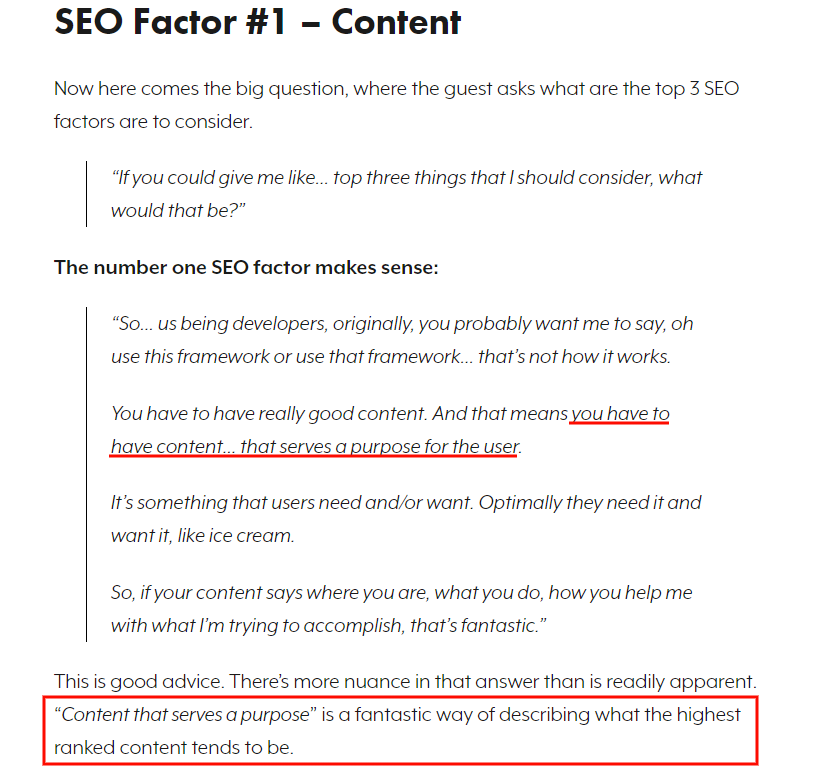

We see this sentiment about the importance of user relevance echoed in other Google sources, too, like the Webmaster Guidelines:


And the Search Quality Evaluator Guidelines (for example, pages without a beneficial purpose get the lowest page quality rating):


Needless to say, concepts like relevancy and beneficial purpose in your content are vital to ranking well.
The only question left is, how do you craft content that meets or exceeds these standards?
Let me answer that question by using one of my #1 ranking blog posts as an example.
Let’s break it down.
How to Infuse Your Content with Relevancy & Beneficial Purpose to Rank Well in Google
Here’s a good example of a blog post created with reader relevancy and beneficial purpose in mind, called “Learn to Write: The Ultimate Guide to Get You Started.”
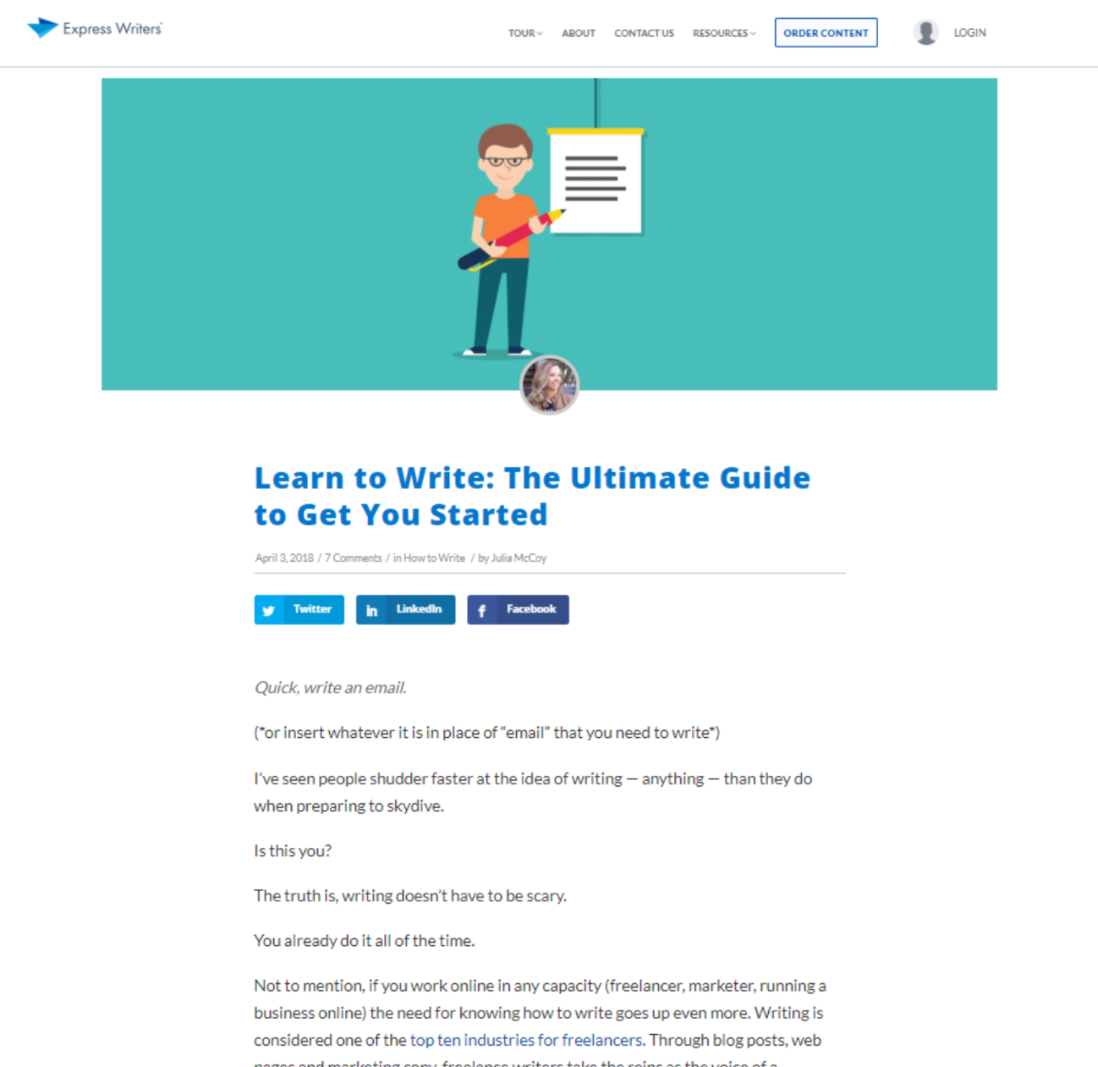

To prove how well it’s working, take a look at the SERP for “learn to write” – the post is currently ranking in the #1 organic position.
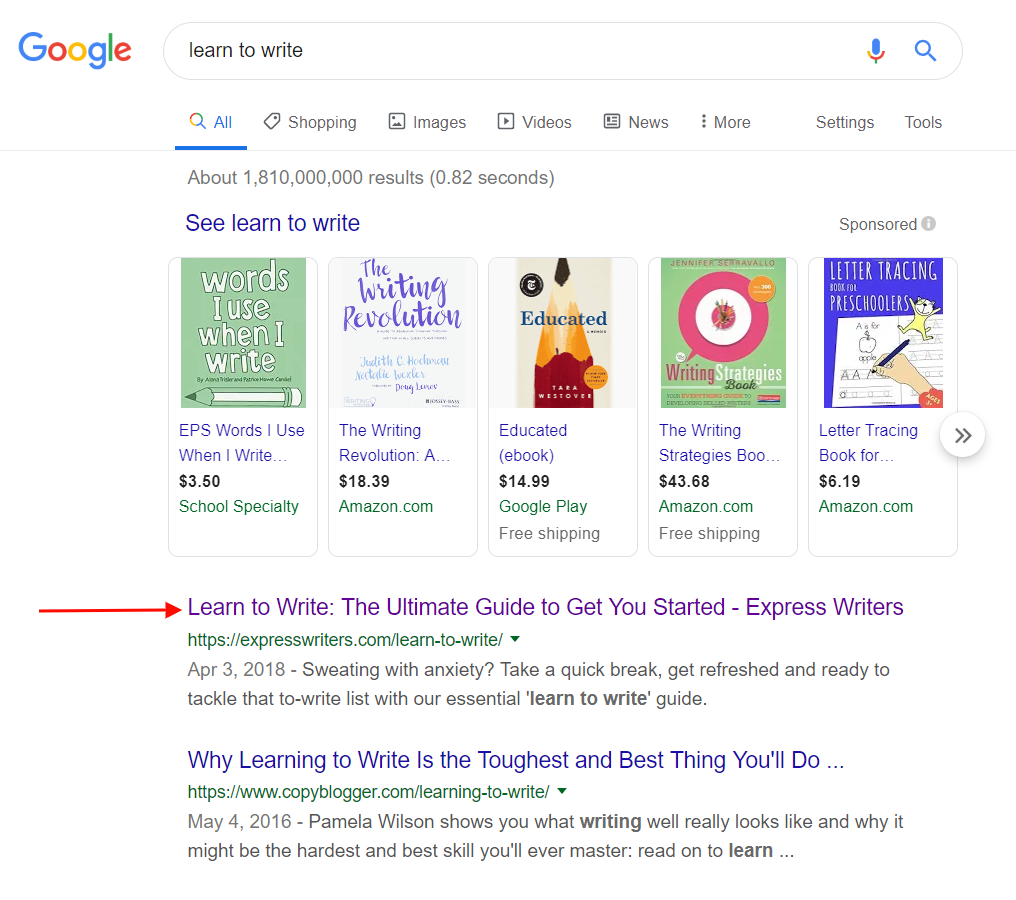

How did I create this content with a purpose, and earn top rankings in Google?
By hyper-focusing on the reader, letting them inform every step of content creation.
First tip: Use the language your readers are using.
1. Speak to Your Reader (Use Their Language)
To create content that’s useful, that serves a purpose for the reader, you need to use the language they’re using.
This may seem simple, but it needs research backing it up to ensure you’re on the right track.
You can’t just guess at how your readers describe their problems, interests, and desires because you’ll probably guess wrong.
Instead, it’s important to do social listening, talk to actual customers, gather examples, and base the language you use in your content on what you discover.
We have a defined audience we speak to based on a persona we created – a fictional archetype of our ideal customer. This persona stems solely from audience research.
As you can see, our tone of voice and language are laid-back but professional, fun yet never sloppy, direct, engaging, and geared toward a younger, millennial audience.
We never would have pinpointed this tone without audience research!
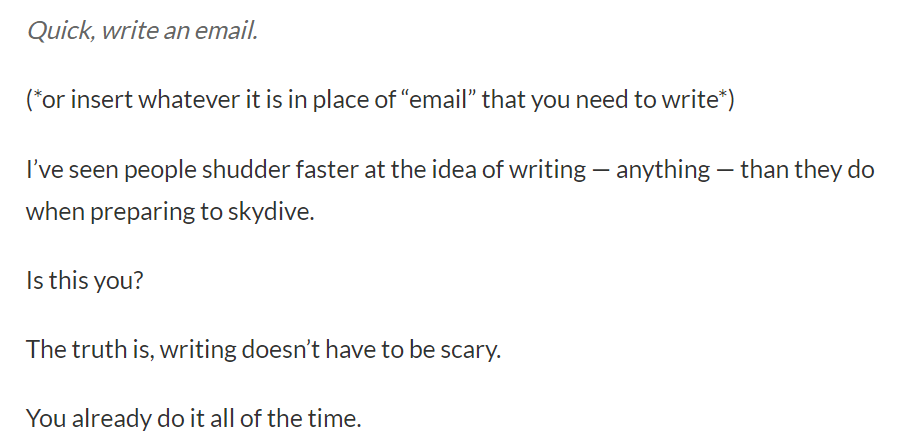

2. Speak to Your Readers’ Problems
Luckily, audience research does a lot more than tell you who you’re writing for. It also pinpoints your readers’ problems – especially the ones you (and only you, with your unique expertise) can solve, improve, or alleviate.
This is a big, big part of infusing your content with beneficial purpose and relevance.
The reader problem I address in our example blog is relatively straightforward: They may be afraid of writing, but they need to learn to do it better to achieve more in their day-to-day lives.
As an online writing expert with a content agency, I’m uniquely positioned to help them.
Note how I speak to Millennial-centered facets of this problem in our example.
For instance, most of our readers will be young professionals who need to use writing in at least one aspect of their job. I directly address this in the first section:
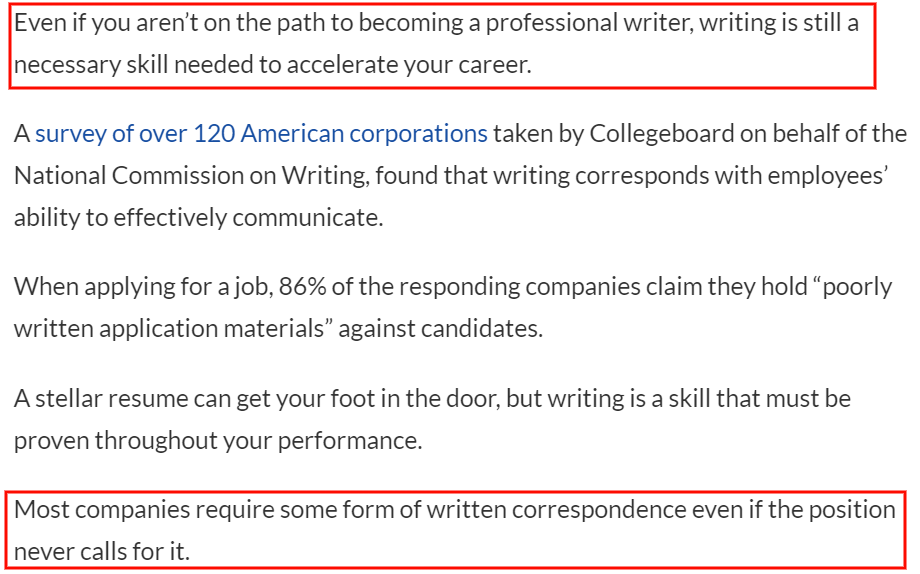

In particular, I’m reminding them why learning to write matters for them and their particular needs.
If you can answer the question “why should the reader care about this content?” inside the blog you’re writing, that’s a sign you’re on the right track to infusing your content with a purpose.
3. Use Keywords with Your Content’s Purpose & Reader Vocabulary in Mind
The purpose of your content is the problem you’re solving for the reader (and keep in mind that the problem can be as simple as making them laugh and lightening their day or as complex as teaching them how to code a website).
Your keywords should connect to that problem, as well as use the reader’s vocabulary.
- The problem you’re solving: You should be able to condense the reader problem you’re solving (“I need to learn to write more effectively”) into a simpler keyword phrase (e.g. “learn to write”).
- Audience questions: Audience questions will form the keywords you use, too. For example, your readers might be asking Google “how to write well,” “learn to write,” “professional writing,” or “writing for the web.”
- Related terms: If you scroll to the bottom of the SERP for your main keyword, you’ll find related terms users are actually searching as well.
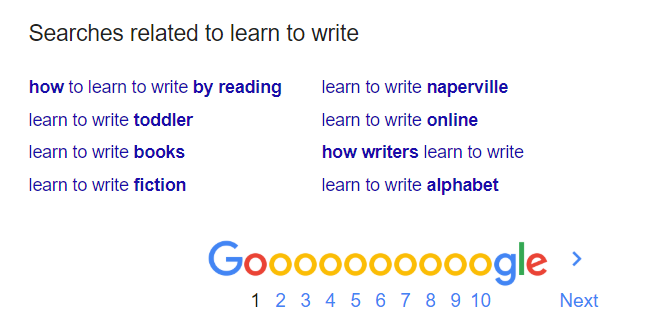

Don’t forget to vet all the keywords you find. Research them with keyword tools and make sure they’re good fits for your brand to target (for instance, if the competition is too steep, small brands have a slim chance of ranking even if your content is amazing, user-relevant, and purposeful).
4. Avoid Industry Jargon & Insider-Speak
Repeat after me: The way you talk about your business/industry/products/services is not the way your customers talk about them.
Undecipherable jargon in your content can be its downfall. It’s like talking about an inside joke with a friend in a room full of strangers – totally awkward for everyone outside that “in-the-know” bubble.
You never want your readers to feel awkward, confused, belittled, or stupid.
That’s why, in our example blog post, we don’t talk about nitty-gritty grammar details like Oxford commas or em-dashes. We don’t go over their heads with spiels about modifiers and determiners.
We definitely don’t include nerdy, writers-only references. (We save those for our team discussions.)
Instead, the focus is on being relatable, relevant, and easy to understand.
When I make references, they’re to universally understood concepts, like salespeople and common sayings.
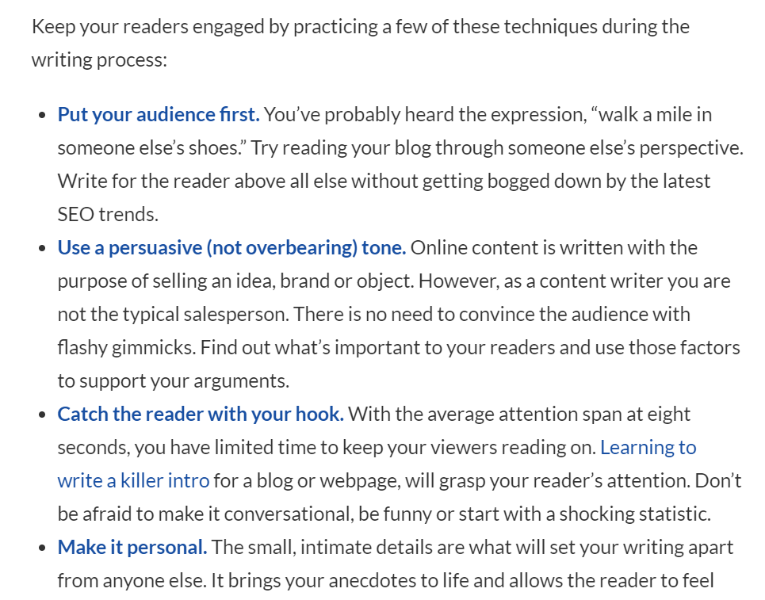

Insider-speak is for conversations with your work colleagues, not for talking to your audience. Instead, aim to have empathy and put yourself in your readers’ shoes.
Try to understand their problems from their point-of-view and provide the answers in ways they’ll connect with – your content will be better for it.
Crafting User-Focused Content: Make It Priority #1 to Be #1
Content isn’t about you, your brand, or your business.
It’s about the user.
Added to that, Google loves content that serves a beneficial purpose for the user. If it doesn’t help the target reader in a quantifiable way, if it doesn’t answer the question they were asking in the Google search bar, it’s no good.
To make your content shoot to the top of the SERPs, you need to make it useful, purposeful, and relevant. Follow these tips, and you’ll be well on your way.
SEO
Measuring Content Impact Across The Customer Journey
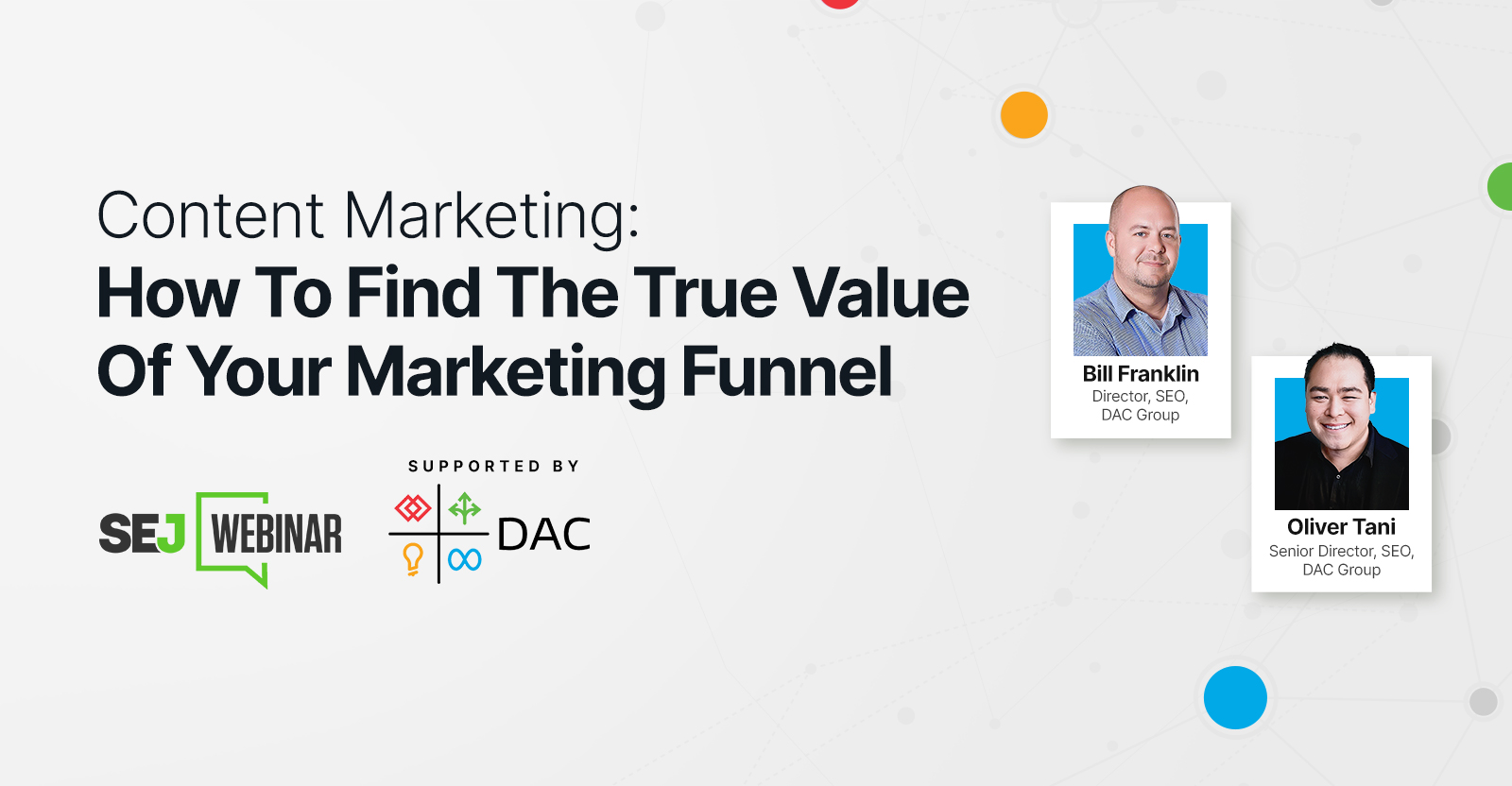
Understanding the impact of your content at every touchpoint of the customer journey is essential – but that’s easier said than done. From attracting potential leads to nurturing them into loyal customers, there are many touchpoints to look into.
So how do you identify and take advantage of these opportunities for growth?
Watch this on-demand webinar and learn a comprehensive approach for measuring the value of your content initiatives, so you can optimize resource allocation for maximum impact.
You’ll learn:
- Fresh methods for measuring your content’s impact.
- Fascinating insights using first-touch attribution, and how it differs from the usual last-touch perspective.
- Ways to persuade decision-makers to invest in more content by showcasing its value convincingly.
With Bill Franklin and Oliver Tani of DAC Group, we unravel the nuances of attribution modeling, emphasizing the significance of layering first-touch and last-touch attribution within your measurement strategy.
Check out these insights to help you craft compelling content tailored to each stage, using an approach rooted in first-hand experience to ensure your content resonates.
Whether you’re a seasoned marketer or new to content measurement, this webinar promises valuable insights and actionable tactics to elevate your SEO game and optimize your content initiatives for success.
View the slides below or check out the full webinar for all the details.
SEO
How to Find and Use Competitor Keywords

Competitor keywords are the keywords your rivals rank for in Google’s search results. They may rank organically or pay for Google Ads to rank in the paid results.
Knowing your competitors’ keywords is the easiest form of keyword research. If your competitors rank for or target particular keywords, it might be worth it for you to target them, too.
There is no way to see your competitors’ keywords without a tool like Ahrefs, which has a database of keywords and the sites that rank for them. As far as we know, Ahrefs has the biggest database of these keywords.
How to find all the keywords your competitor ranks for
- Go to Ahrefs’ Site Explorer
- Enter your competitor’s domain
- Go to the Organic keywords report
The report is sorted by traffic to show you the keywords sending your competitor the most visits. For example, Mailchimp gets most of its organic traffic from the keyword “mailchimp.”


Since you’re unlikely to rank for your competitor’s brand, you might want to exclude branded keywords from the report. You can do this by adding a Keyword > Doesn’t contain filter. In this example, we’ll filter out keywords containing “mailchimp” or any potential misspellings:


If you’re a new brand competing with one that’s established, you might also want to look for popular low-difficulty keywords. You can do this by setting the Volume filter to a minimum of 500 and the KD filter to a maximum of 10.


How to find keywords your competitor ranks for, but you don’t
- Go to Competitive Analysis
- Enter your domain in the This target doesn’t rank for section
- Enter your competitor’s domain in the But these competitors do section


Hit “Show keyword opportunities,” and you’ll see all the keywords your competitor ranks for, but you don’t.


You can also add a Volume and KD filter to find popular, low-difficulty keywords in this report.


How to find keywords multiple competitors rank for, but you don’t
- Go to Competitive Analysis
- Enter your domain in the This target doesn’t rank for section
- Enter the domains of multiple competitors in the But these competitors do section


You’ll see all the keywords that at least one of these competitors ranks for, but you don’t.


You can also narrow the list down to keywords that all competitors rank for. Click on the Competitors’ positions filter and choose All 3 competitors:


- Go to Ahrefs’ Site Explorer
- Enter your competitor’s domain
- Go to the Paid keywords report


This report shows you the keywords your competitors are targeting via Google Ads.
Since your competitor is paying for traffic from these keywords, it may indicate that they’re profitable for them—and could be for you, too.
You know what keywords your competitors are ranking for or bidding on. But what do you do with them? There are basically three options.
1. Create pages to target these keywords
You can only rank for keywords if you have content about them. So, the most straightforward thing you can do for competitors’ keywords you want to rank for is to create pages to target them.
However, before you do this, it’s worth clustering your competitor’s keywords by Parent Topic. This will group keywords that mean the same or similar things so you can target them all with one page.
Here’s how to do that:
- Export your competitor’s keywords, either from the Organic Keywords or Content Gap report
- Paste them into Keywords Explorer
- Click the “Clusters by Parent Topic” tab


For example, MailChimp ranks for keywords like “what is digital marketing” and “digital marketing definition.” These and many others get clustered under the Parent Topic of “digital marketing” because people searching for them are all looking for the same thing: a definition of digital marketing. You only need to create one page to potentially rank for all these keywords.


2. Optimize existing content by filling subtopics
You don’t always need to create new content to rank for competitors’ keywords. Sometimes, you can optimize the content you already have to rank for them.
How do you know which keywords you can do this for? Try this:
- Export your competitor’s keywords
- Paste them into Keywords Explorer
- Click the “Clusters by Parent Topic” tab
- Look for Parent Topics you already have content about
For example, if we analyze our competitor, we can see that seven keywords they rank for fall under the Parent Topic of “press release template.”


If we search our site, we see that we already have a page about this topic.


If we click the caret and check the keywords in the cluster, we see keywords like “press release example” and “press release format.”


To rank for the keywords in the cluster, we can probably optimize the page we already have by adding sections about the subtopics of “press release examples” and “press release format.”
3. Target these keywords with Google Ads
Paid keywords are the simplest—look through the report and see if there are any relevant keywords you might want to target, too.
For example, Mailchimp is bidding for the keyword “how to create a newsletter.”


If you’re ConvertKit, you may also want to target this keyword since it’s relevant.
If you decide to target the same keyword via Google Ads, you can hover over the magnifying glass to see the ads your competitor is using.


You can also see the landing page your competitor directs ad traffic to under the URL column.


Learn more
Check out more tutorials on how to do competitor keyword analysis:
SEO
Google Confirms Links Are Not That Important

Google’s Gary Illyes confirmed at a recent search marketing conference that Google needs very few links, adding to the growing body of evidence that publishers need to focus on other factors. Gary tweeted confirmation that he indeed say those words.
Background Of Links For Ranking
Links were discovered in the late 1990’s to be a good signal for search engines to use for validating how authoritative a website is and then Google discovered soon after that anchor text could be used to provide semantic signals about what a webpage was about.
One of the most important research papers was Authoritative Sources in a Hyperlinked Environment by Jon M. Kleinberg, published around 1998 (link to research paper at the end of the article). The main discovery of this research paper is that there is too many web pages and there was no objective way to filter search results for quality in order to rank web pages for a subjective idea of relevance.
The author of the research paper discovered that links could be used as an objective filter for authoritativeness.
Kleinberg wrote:
“To provide effective search methods under these conditions, one needs a way to filter, from among a huge collection of relevant pages, a small set of the most “authoritative” or ‘definitive’ ones.”
This is the most influential research paper on links because it kick-started more research on ways to use links beyond as an authority metric but as a subjective metric for relevance.
Objective is something factual. Subjective is something that’s closer to an opinion. The founders of Google discovered how to use the subjective opinions of the Internet as a relevance metric for what to rank in the search results.
What Larry Page and Sergey Brin discovered and shared in their research paper (The Anatomy of a Large-Scale Hypertextual Web Search Engine – link at end of this article) was that it was possible to harness the power of anchor text to determine the subjective opinion of relevance from actual humans. It was essentially crowdsourcing the opinions of millions of website expressed through the link structure between each webpage.
What Did Gary Illyes Say About Links In 2024?
At a recent search conference in Bulgaria, Google’s Gary Illyes made a comment about how Google doesn’t really need that many links and how Google has made links less important.
Patrick Stox tweeted about what he heard at the search conference:
” ‘We need very few links to rank pages… Over the years we’ve made links less important.’ @methode #serpconf2024″
Google’s Gary Illyes tweeted a confirmation of that statement:
“I shouldn’t have said that… I definitely shouldn’t have said that”
Why Links Matter Less
The initial state of anchor text when Google first used links for ranking purposes was absolutely non-spammy, which is why it was so useful. Hyperlinks were primarily used as a way to send traffic from one website to another website.
But by 2004 or 2005 Google was using statistical analysis to detect manipulated links, then around 2004 “powered-by” links in website footers stopped passing anchor text value, and by 2006 links close to the words “advertising” stopped passing link value, links from directories stopped passing ranking value and by 2012 Google deployed a massive link algorithm called Penguin that destroyed the rankings of likely millions of websites, many of which were using guest posting.
The link signal eventually became so bad that Google decided in 2019 to selectively use nofollow links for ranking purposes. Google’s Gary Illyes confirmed that the change to nofollow was made because of the link signal.
Google Explicitly Confirms That Links Matter Less
In 2023 Google’s Gary Illyes shared at a PubCon Austin that links were not even in the top 3 of ranking factors. Then in March 2024, coinciding with the March 2024 Core Algorithm Update, Google updated their spam policies documentation to downplay the importance of links for ranking purposes.
The documentation previously said:
“Google uses links as an important factor in determining the relevancy of web pages.”
The update to the documentation that mentioned links was updated to remove the word important.
Links are not just listed as just another factor:
“Google uses links as a factor in determining the relevancy of web pages.”
At the beginning of April Google’s John Mueller advised that there are more useful SEO activities to engage on than links.
Mueller explained:
“There are more important things for websites nowadays, and over-focusing on links will often result in you wasting your time doing things that don’t make your website better overall”
Finally, Gary Illyes explicitly said that Google needs very few links to rank webpages and confirmed it.
I shouldn’t have said that… I definitely shouldn’t have said that
— Gary 鯨理/경리 Illyes (so official, trust me) (@methode) April 19, 2024
Why Google Doesn’t Need Links
The reason why Google doesn’t need many links is likely because of the extent of AI and natural language undertanding that Google uses in their algorithms. Google must be highly confident in its algorithm to be able to explicitly say that they don’t need it.
Way back when Google implemented the nofollow into the algorithm there were many link builders who sold comment spam links who continued to lie that comment spam still worked. As someone who started link building at the very beginning of modern SEO (I was the moderator of the link building forum at the #1 SEO forum of that time), I can say with confidence that links have stopped playing much of a role in rankings beginning several years ago, which is why I stopped about five or six years ago.
Read the research papers
Authoritative Sources in a Hyperlinked Environment – Jon M. Kleinberg (PDF)
The Anatomy of a Large-Scale Hypertextual Web Search Engine
Featured Image by Shutterstock/RYO Alexandre
-

 PPC4 days ago
PPC4 days ago19 Best SEO Tools in 2024 (For Every Use Case)
-

 MARKETING7 days ago
MARKETING7 days agoWill Google Buy HubSpot? | Content Marketing Institute
-
SEARCHENGINES7 days ago
Daily Search Forum Recap: April 16, 2024
-

 SEO7 days ago
SEO7 days agoGoogle Clarifies Vacation Rental Structured Data
-

 MARKETING6 days ago
MARKETING6 days agoStreamlining Processes for Increased Efficiency and Results
-
SEARCHENGINES6 days ago
Daily Search Forum Recap: April 17, 2024
-

 PPC7 days ago
PPC7 days agoHow to Collect & Use Customer Data the Right (& Ethical) Way
-

 SEO6 days ago
SEO6 days agoAn In-Depth Guide And Best Practices For Mobile SEO






